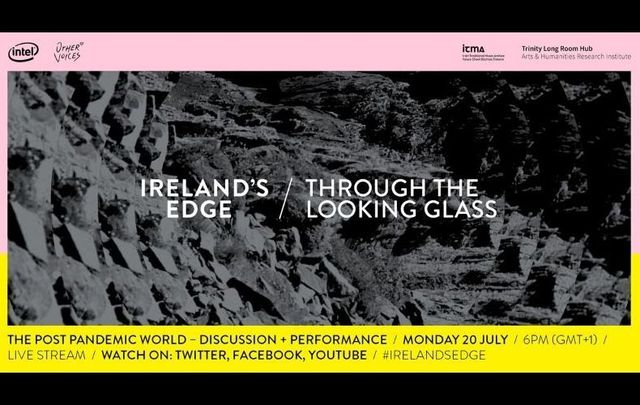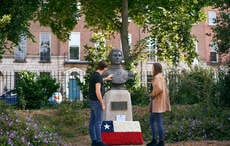“Ireland’s Edge – Through The Looking Glass” presents four new original and personal perspectives on law, technology, art, and music - perspectives that hold key political, cultural, and social significance.
Living in unprecedented times of coronavirus, the familiar landscape has shifted under our feet. So what do we now know about this new world where almost everything looks and seems the same and yet is profoundly changed?
As lawmakers, artists, scientists, technologists, students, and citizens, we have passed through the Looking Glass. Unlike Alice though, we do not know if there is a way back.
Ireland’s Edge – Through The Looking Glass examines new questions raised by our recent and current experiences while reaching back into past times of pandemic. We examine the challenge of encroaching surveillance, issues of data protection, privacy, personal freedom, creativity, ethics, and technology in a time of global pandemic, and consider the power and value of storytelling.
Ireland’s Edge -Through The Looking Glass is a unique digital event streamed live from The Irish Traditional Music Archive (ITMA) on Monday, July 20. It presents four new original and personal perspectives on law, technology, art and music, perspectives that hold key political, cultural, and social significance.
This special live stream will be available to watch on YouTube, Facebook Live, and Twitter. It will also be available right here on IrishCentral, and over on IrishCentral's Facebook page.
This online edition of Ireland’s Edge is supported by Intel Ireland and presented in partnership with Trinity Long Room Hub Arts and Humanities Research Institute and the Irish Traditional Music Archive (ITMA).
Programme for "Ireland's Edge - Through the Looking Glass," live this Monday, July 20:
6 pm IST / 1 pm EST - Music in Times of Pandemic
Father and daughter, Mick O’Brien (Uileann Pipes) and Aoife Ní Bhriain (Fiddle and Violin) perform music from the celebrated Goodman Collection.
Canon James Goodman who held the chair of Irish in Trinity College from 1879 began collecting music as a young man. He made this collection under the shadow of the Irish Famine fully aware that the music of his native West Kerry stood at risk of perishing alongside the millions lost to death and emigration.
This collection of tunes housed in Trinity College Old Library was first published as ‘Tunes of the Munster Pipers ‘ by the Irish Traditional Music Archive in 1998. The music in the collection gives us a unique insight into the dance music and song culture of pre-Famine Ireland. One hundred and fifty years later the Goodman collection has taken on a new resonance.
6:05 pm IST / 1:05 pm EST - Privacy, Data, and the Pandemic
Ms. Justice Marie Baker, Supreme Court of Ireland, in conversation with Dr. David Kenny, Assistant Professor of Law, Trinity College Dublin
The COVID-19 pandemic has seen population-wide contact tracing technology being comprehensively adopted in many countries while under active consideration in others. This has given rise to fears and concerns about violations of privacy and other fundamental rights.
Where do privacy and data protection rights sit in all of this given the urgent need to manage and control the pandemic? Can we trust that our country and others have the legal frameworks in place to comply with the existing law while facilitating these measures? How can we know if and whether deletion of personal data has happened once the crisis has passed? Will powers granted to deal with the crisis be ceded when it is over?
6:40 pm IST / 1:40 pm EST - Adapt or be Damned
Rita Duffy, Artist in Residence, Trinity Long Room Hub, Trinity College Dublin
‘Adapt or be damned’ is an illustrated lecture that brings us on the personal journey of one artist living and working through the strangeness of recent times.
7 pm IST / 2 pm EST - ‘If I Only Had A Heart:’ Humanising the Machine
Dr. Conor McGinn (CEO & Co-Founder of Akara Robotics; Assistant Professor, School of Engineering, TCD; Group Leader, Robotics and Innovation Lab, TCD), Niamh Donnelly (Director of AI & Co-Founder of Akara Robotics( in conversation with Siobhra Quinlan from Ireland’s Edge
Dr. Conor McGinn and Niamh Donnelly will be in conversation with Síobhra Quinlan, discussing Akara’s genesis in Trinity College Dublin, and how it has grown to utilise robotics and AI technology in order to develop socially assistive robots that empower people working in the healthcare sector.
This conversation will explore Akara Robotics’ unique approach to developing Stevie and Violet, leveraging engineering, science, creativity, anthropology, and empathy. They will discuss the importance of ethics in their process, their involvement with the Foundation for Responsible Robotics, and how in these unprecedented times the company has re-prioritised to rapidly respond to the Covid-19 pandemic. How will these learnings be assimilated into the broader vision of Akara Robotics? Peering through the looking glass, how can we best incorporate semi-autonomous robots into the fabric of society?
7:20 pm IST / 2:20 pm EST - Music in Times of Pandemic
A concluding piece of music from the Goodman Collection from Aoife Ní Bhriain and Mick O’Brien
About Trinity Long Room Hub Arts and Humanities Research Institute
Founded in 2006, the Trinity Long Room Hub Arts and Humanities Research Institute is dedicated to advancing Trinity College Dublin’s rich tradition of research excellence in the Arts and Humanities, on an individual, collaborative and inter-disciplinary basis
About the Irish Traditional Music Archive (ITMA)
Irish Traditional Music Archive (ITMA) is the national public archive and resource centre for Irish traditional music, song, and dance, and the globally-recognized specialist advisory agency to advance appreciation, knowledge, and the practice of Irish traditional music. Established in 1987 and funded by the Arts Council / An Chomhairle Ealaíon, and the Arts Council of Northern Ireland, the role of ITMA is to: collect and preserve the historical and contemporary materials of Irish traditional music.




Comments